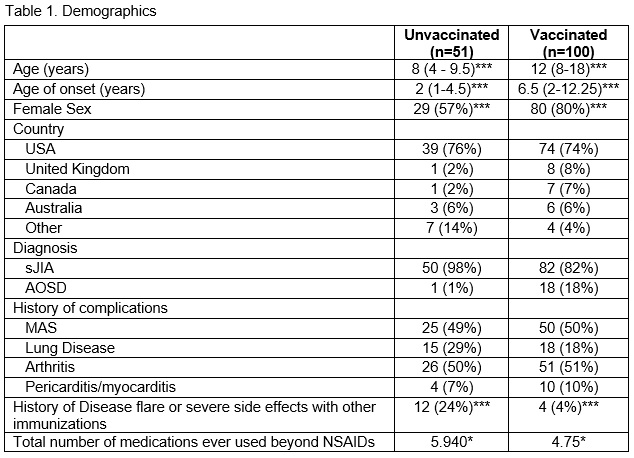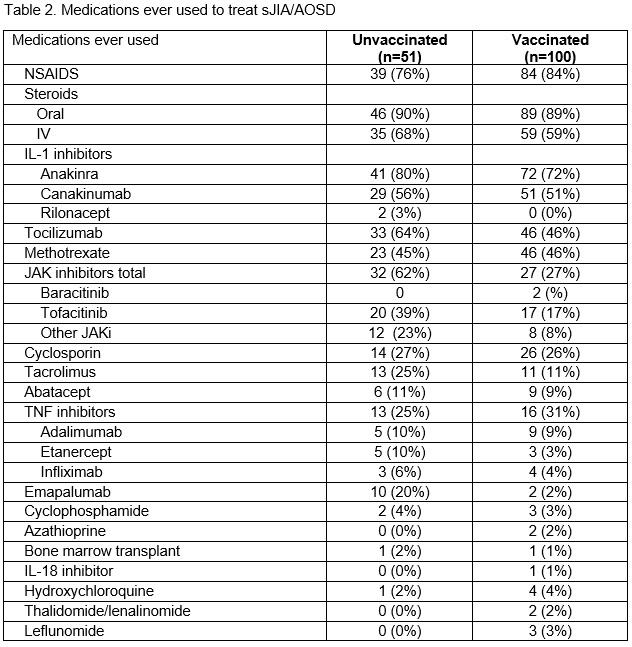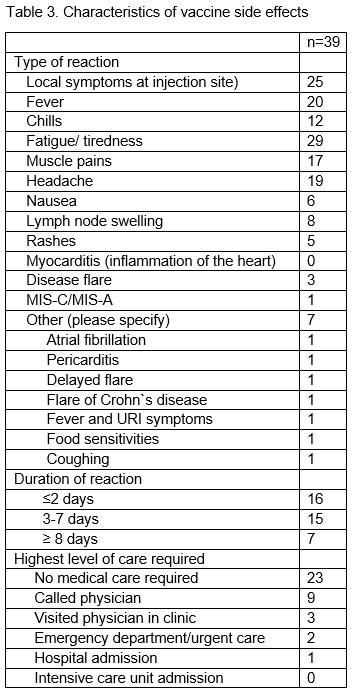Session Information
Session Type: Poster Session B
Session Time: 5:00PM-6:00PM
Background/Purpose: Immunization is one of the most important tools for the control of the Covid-19 pandemic. The safety and effectiveness of the Covid-19 immunizations have been established for the general population and in patients with autoimmune and autoinflammatory conditions. However, given it`s rarity, patients with systemic juvenile idiopathic arthritis (sJIA) and adult onset Still`s disease (AOSD) have been under-represented in these studies. Therefore, we performed a survey with patients with sJIA and AOSD to inquire about the safety and tolerability of the Covid-19 immunization in this population.
Methods: We performed an anonymous online survey on closed Facebook groups for patients and parents with sJIA and AOSD from June 27th until August 30th, 2022 on the SurveyMonkey platform. It consisted of 27 close-ended questions in English, with a space for further comments. Inclusion criteria included a diagnosis of sJIA or AOSD self-reported by the respondent. Consent was obtained at the beginning of the survey.
Results: Of a total of 167 responses, 16 were excluded (2 respondents were 18 years old,14 failed to complete the survey). Table 1 and Table 2 show the demographics of the cohort, divided by vaccination status. Most patients received the Pfizer/Biontech vaccine (88%), followed by Moderna (18%) and Oxford/Astra Zeneca (6%). Fifty three percent of patients had inactive and 38% of patients had active disease at the time of the immunization, and 4% had the vaccine prior to the diagnosis. Twelve patients paused medications for the immunization. Thirty-nine patients reported vaccine side effects (Table 2). The most commonly listed reasons for patients to not receive the Covid-19 vaccine were concern about potential side effects from the vaccine related to sJIA/AOSD (58%) and not related to sJIA/AOSD diagnosis (46%), vaccine unavailable for age group/location (26%), medical provider recommendation to not receive the vaccine (12%), concern about potential interaction of the vaccine with patient`s medications including loss of effectiveness (11%) and allergy to a vaccine component (6%). Forty-seven (48%) immunized patients tested positive for Covid-19 at some point, compared with 33 (66%) non-immunized patients. Most patients had asymptomatic (18%), or mild/moderate (58%) symptoms. However, one immunized patient required hospitalization in a general ward, one non-immunized patient required ICU admission for the Covid-19 infection. Another non-immunized patient died of severe disease flare after the Covid-19 infection. There was a trend toward higher risk of disease flare after Covid-19 infection among non-immunized patients (43%), compared to immunized patients (25%), but it was not statistically significant.
Conclusion: The Covid-19 vaccine was well tolerated by sJIA and AOSD patients even in this group of patients with high incidence of macrophage activation syndrome and lung disease. Most vaccine side effects were mild and lasted less than 7 days. There was a low incidence of disease flare with immunization (3%). There was a trend towards lower risk of flare with the Covid-19 infection in the immunized group. The only ICU admission and only death occurred in unvaccinated subjects.
 *p ≤ 0.05,** p ≤ 0.01, ***p ≤ 0.001.
*p ≤ 0.05,** p ≤ 0.01, ***p ≤ 0.001.
MAS: macrophage activation syndrome, sJIA: systemic juvenile idiopathic arthritis, AOSD: adult-onset Still`s disease, NSAIDs: non-steroidal anti-inflammatory drugs
To cite this abstract in AMA style:
Correia Marques M, Subrata P, Lake C, Bergeron L, Sinha R, Peixoto L, Twilt M, Ombrello M. Survey of Covid-19 Immunization and Infection in Patients with Systemic Juvenile Idiopathic Arthritis and Adult Onset Still’s Disease [abstract]. Arthritis Rheumatol. 2023; 75 (suppl 4). https://acrabstracts.org/abstract/survey-of-covid-19-immunization-and-infection-in-patients-with-systemic-juvenile-idiopathic-arthritis-and-adult-onset-stills-disease/. Accessed .« Back to 2023 Pediatric Rheumatology Symposium
ACR Meeting Abstracts - https://acrabstracts.org/abstract/survey-of-covid-19-immunization-and-infection-in-patients-with-systemic-juvenile-idiopathic-arthritis-and-adult-onset-stills-disease/


